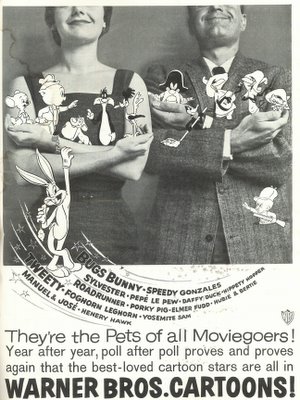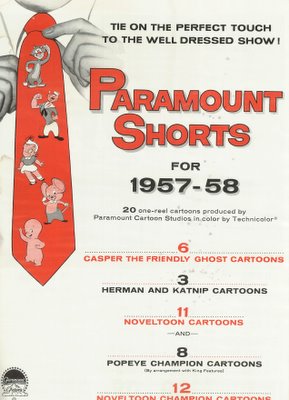


Cartoons, Theatres, and TV --- Part 3
With so many cartoons choking the airwaves during the 1957-58 season, it’s no wonder exhibitors saw red. As far as they were concerned, theatres had been betrayed by the very industry they’d supported for over half a century. Saturday business was virtually a write-off as far as once loyal kid audiences were concerned. TV westerns and sci-fi programs had obliterated the "B" westerns and serials, once a mainstay for weekend showmen, and comedy shorts were essentially gone. Only Columbia bothered with these, as The Three Stooges limped along toward the end of their twenty-five year run for the company. They say television didn’t really penetrate every part of the country until 1956. Sounds right enough, for 1956 was sure a year for transition. First you had the massive studio dump of theatrical features and cartoons to TV; then the serials ended with Columbia’s Blazing The Overland Trail. Universal had just let go Abbott and Costello, and wrapped up the Francis and Ma and Pa Kettles. Series features were by now too much like television shows, and TV was free besides. Here in the south, we tended to run about ten years behind the rest of the country anyway, so much of the old product hung on a lot longer for us. Greenbriar has been astonished by what occasional searches of old newspaper ads reveal about the longevity of older product in southern houses. First off, we had serials running full-tilt right through to the mid-sixties; long after the rest of the country had abandoned them. I remember seeing Panther Girl Of The Kongo at our Liberty Theatre in 1967, having already caught a few chapters of the same serial on television several years before. The "Circle K" was a kid’s service organization during the sixties (may still be), and their Greensboro, NC chapter ran The Purple Monster Strikes for meetings at the Carolina Theatre in the summer of 1966. While the rest of the country was "discovering" the old serials and celebrating their "camp" and retro-ironies, we were still using them as standard exhibition policy, and without a trace of irony!
The only immediate casualty of the television/theatre wars, for us anyway, were the cartoons. They just seemed to vanish from the program. Companies continued to make them, and re-issued the old ones as well, but I’m hanged if I can recall ever seeing more than a handful in our local theatre, let alone any good ones. A look at the ads shown here will reveal what three of the major studios were peddling for the 1957-58 season. It’s pretty depressing. Paramount’s still got Popeye, but those things were real agony to get through by that time, and Casper --- yechh! I got so sick of him on those Matty’s Funday Funnies shows (or Sunday Funnies, depending on the day). He (or perhaps she, as gender was always in doubt) always played so sweet and nice, never assertive or aggressive no matter what the provocation. A mother’s idea, perhaps, of what her children should be watching in cartoons. I never experienced Casper in the theater. Had I done so, I may well have demanded the refund of my dime (yes, we got in for 10 cents until 1961). Herman and Katnip were an ersatz Tom and Jerry, their catch-penny antics making even the diminished efforts of MGM’s cat-and-mouse team look positively lavish by comparison. And look at these Columbia things! Ham and Hattie? Who in the hell are they? I never heard of them until I ran across this trade ad. Would Jerry Beck or someone please enlighten me? (oh, and by the way, thanks for the boost on your fantastic CARTOON BREW website, Jerry). Then there’s Mr. Magoo --- boy, if you’ve seen one of these, you’ve seen them all. As a kid, I had but to see him starting across town in that jalopy yelling Roadhog!, and it was Greetings, Gate! as Jerry Colonna used to say. Warners was at least still trying to make decent cartoons. Records show they released twenty new ones in the 57-58 group, the average expense being $25,942. On one end, you had Woe Be Gone costing $20,905, and on the high side there’s Knighty Knight Bugs at $29,740. I always wanted to see WB cartoons theatrically, but our beloved Liberty just would not play them, despite my entreaties. Did they cost too much? I wouldn’t think so, as I know MGM was getting an average of just $4.60 per booking around that time for new cartoons, and only $3.13 each for the re-issues. All we got for cartoons in the theatre, at least by the sixties when I was going strong, was The Pink Panther and those gag-inducing Woodpecker things from Universal. Was there anything so odious as a latter-day Woodpecker? I’m glad Walter Lantz lived long enough to be the elder statesman of cartoons, but we think he achieved the status less for merit, than for the fact that he just kept hanging on, waiting for all of the really great animators to die! That’s okay Walter, we liked your avuncular and reassuring presence on the Woody TV show, even though you were kinda boring there too. The Panthers always seemed like cartoons for sophisticates, the sort Bosley Crowther might tolerate while he’s waiting for The Lion In Winter to start. Down here, waiting for something like The Reluctant Astronaut to start, we found the Panthers l-o-n-g and, what’s the word, minimalist? Anyway, that term animators use when there’s absolutely nothing to look at on the screen other than that damned Panther and a lot of empty space. That’s probably what Crowther liked about them.
